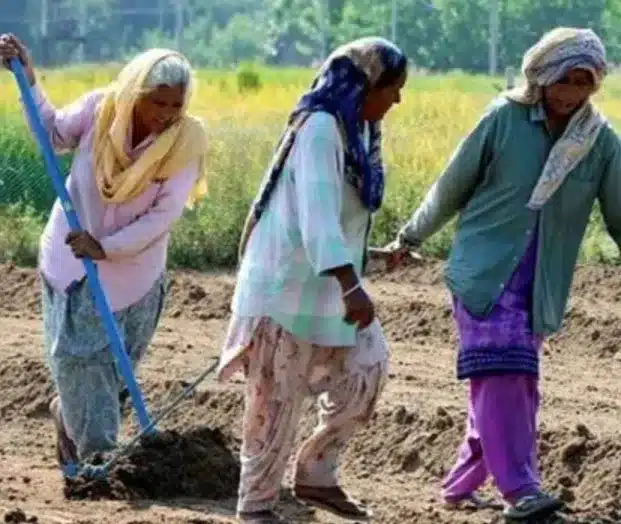What’s in today’s article?
- Why in News?
- What is Natural farming?
- What is National Mission on Natural Farming (NMNF)?
- Need for a mission on natural farming
Why in News?
The Union Cabinet approved the launch of the National Mission on Natural Farming (NMNF) as a standalone Centrally Sponsored Scheme under the Ministry of Agriculture & Farmers’ Welfare.
The mission aims to promote natural farming practices across India in a focused, mission-mode approach.
What is Natural Farming?
- About
- The Agriculture Ministry defines natural farming as a “chemical-free” farming system that only uses inputs produced using livestock and plant resources.
- It is a system where the laws of nature are applied to agricultural practices.
- This method works along with the natural biodiversity of each farmed area.
- It encourages the complexity of living organisms, both plants, and animals that shape each particular ecosystem to thrive along with food plants.
- Natural Farming in India
- There are many working models of natural farming all over the world, the zero-budget natural farming (ZBNF) is the most popular model in India.
- ZBNF was popularized by Subhash Palekar in India.
What is National Mission on Natural Farming (NMNF)?
- Background
- NMNF builds on the Bhartiya Prakritik Krishi Paddhti (BPKP), launched under the Paramparagat Krishi Vikas Yojna (PKVY).
- The Centre also promoted natural farming in a five-kilometre belt along the Ganga River under the Namami Gange scheme in the financial year 2022-23.
- In her Budget Speech (2024-25), Finance Minister Nirmala Sitharaman announced a plan to initiate one crore farmers countrywide into natural farming in the next two years.
- About
- The government launched the NMNF within 100 days of returning to power in 2024, with a target to initiate one crore farmers into natural farming over the next two years.
- This initiative will include certification, branding, and the establishment of 10,000 bio-input resource centres, implemented via scientific institutions and gram panchayats.
- Mission Objectives
- Promote sustainable agriculture through natural farming.
- Create a robust infrastructure for training, certification, and branding of chemical-free produce.
- Develop a large-scale adoption model through effective farmer support and community engagement.
- Coverage under natural farming
- Current Coverage – 22 lakh hectares under natural farming; 34 lakh farmers engaged nationwide.
- Breakdown of Coverage
- 4 lakh hectares under the Bhartiya Prakritik Krishi Paddhti (BPKP)
- 88,000 hectares under Namami Gange
- 17 lakh hectares under various state government initiatives.
- Goals of the National Mission on Natural Farming (NMNF)
- Target Area Expansion: Add 7.5 lakh hectares under natural farming.
- Cluster-Based Implementation: Establish 15,000 clusters in willing Gram Panchayats.
- Farmer Outreach: Reach 1 crore farmers within two years.
- Support Infrastructure
- Bio-input Resource Centres (BRCs)
- Set up 10,000 centres to provide ready-to-use natural farming inputs.
- Priority to areas with existing natural farming practices, SRLM, PACS, and FPOs.
- Bio-input Resource Centres (BRCs)
- Infrastructure and Implementation Plans
- Model Demonstration Farms
- Establish 2,000 farms at Krishi Vigyan Kendras (KVKs), Agricultural Universities (AUs), and farmers’ fields.
- Supported by experienced Farmer Master Trainers.
- Farmer Training Programs
- Train 18.75 lakh farmers in natural farming practices and input preparation (e.g., Jeevamrit, Beejamrit).
- Community Engagement
- Deploy 30,000 Krishi Sakhis/Community Resource Persons (CRPs) for awareness, mobilization, and handholding.
- Bio-Input Resources
- Farmers will use livestock resources or procure inputs from Bio-Input Resource Centres (BRCs).
- Model Demonstration Farms
- Key Differences Between NMNF and Earlier Initiatives
- Higher Budgetary Allocation: Total outlay: Rs. 2,481 crore (Central share: Rs. 1,584 crore; State share: Rs. 897 crore) until the 15th Finance Commission (2025-26).
- Broader Target Group: Aims to benefit over 1 crore farmers.
- Focus on Ecosystem Development
- Establishes scientifically supported standards for natural farming practices.
- Simplifies certification for chemical-free produce.
- Proposes a single national brand for natural produce.
Need for a mission on natural farming
- To promote natural farming practices
- There was a growing need for promoting natural farming practices.
- Many districts with high fertilizer sale
- 228 districts across 16 states have been identified with fertiliser usage above the national average of 138 kg/hectare in 2022-23.
- These districts have been targeted in the NMNF.
- Also, special focus will be given on districts where fertiliser use exceeds 200 kg/hectare.
- It also includes a 5 km-wide area along the main stem of the Ganga River.
- Economic Benefits
- Reduces input costs for farmers by minimizing dependency on externally purchased fertilisers and pesticides.
- Soil and Environmental Health
- Improves soil health, fertility, and quality.
- Increases soil carbon content, enhances biodiversity, and promotes microorganisms.
- Builds resilience to climate risks such as waterlogging, floods, and droughts.
- Health and Nutrition
- Reduces health risks associated with fertilisers and pesticides.
- Provides nutritious food for farmers’ families.
- Intergenerational Benefits
- Ensures a healthy Mother Earth for future generations through sustainable farming.
Q.1. What is the National Mission on Natural Farming (NMNF)?
The NMNF is a centrally sponsored scheme launched by the Union Cabinet to promote chemical-free farming across India. It focuses on natural farming practices, aiming to reach one crore farmers and expand natural farming to 7.5 lakh hectares by 2026.
Q.2. What are the benefits of natural farming under NMNF?
Natural farming reduces input costs for farmers, enhances soil fertility, builds climate resilience, and promotes biodiversity. It also provides nutritious, chemical-free food while ensuring a sustainable environment for future generations.
News: All about the central government scheme to promote natural farming | NITI Aayog
Last updated on December, 2025
→ Check out the latest UPSC Syllabus 2026 here.
→ Join Vajiram & Ravi’s Interview Guidance Programme for expert help to crack your final UPSC stage.
→ UPSC Mains Result 2025 is now out.
→ UPSC Notification 2026 is scheduled to be released on January 14, 2026.
→ UPSC Calendar 2026 is released on 15th May, 2025.
→ The UPSC Vacancy 2025 were released 1129, out of which 979 were for UPSC CSE and remaining 150 are for UPSC IFoS.
→ UPSC Prelims 2026 will be conducted on 24th May, 2026 & UPSC Mains 2026 will be conducted on 21st August 2026.
→ The UPSC Selection Process is of 3 stages-Prelims, Mains and Interview.
→ UPSC Result 2024 is released with latest UPSC Marksheet 2024. Check Now!
→ UPSC Prelims Result 2025 is out now for the CSE held on 25 May 2025.
→ UPSC Toppers List 2024 is released now. Shakti Dubey is UPSC AIR 1 2024 Topper.
→ UPSC Prelims Question Paper 2025 and Unofficial Prelims Answer Key 2025 are available now.
→ UPSC Mains Question Paper 2025 is out for Essay, GS 1, 2, 3 & GS 4.
→ UPSC Mains Indian Language Question Paper 2025 is now out.
→ UPSC Mains Optional Question Paper 2025 is now out.
→ Also check Best IAS Coaching in Delhi

















